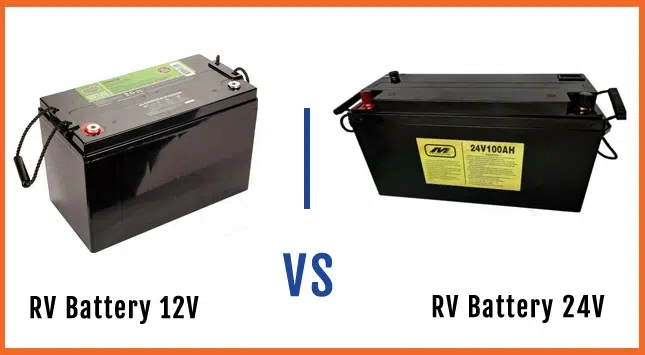Last Updated on May 1, 2023
The right battery can make a huge difference in RVing and keeping the power flowing. 12V and 24V batteries are the two most common types used in RVs, but what are their differences?
The main difference is that 12-volt RV batteries have six cells, whereas 24-volt RV batteries have 12 cells. When drawing larger amounts of power, 12V systems require large wires due to the high current (amps), in contrast to 24V systems that use half the current.
Our ultimate guide will assist you in choosing the right battery for your RV. You will find everything you need to know about “RV battery 12V VS 24V” in this guide, which includes both pros and cons of each type of battery and the size you need.
RV Battery 12V VS 24V: What are the Features of a 12V RV Battery?

If you own an RV, then you know that having a reliable 12V battery is key. What features do 12V RV batteries have, and how does a 12V RV battery differ from a 12V car battery? Take a look at the features and benefits of this type of battery to make the best choice for your vehicle.
Type and Size
One of the most common types of 12V RV batteries is lead acid deep cycle batteries, which are available in various sizes. Choose the right size for your needs too large, and it will be heavier than necessary; too small, and it won’t provide enough power. The size you need will depend on how much electricity you plan to use while in camp.
Capacity & Power
The capacity (also called amp hours) is an important feature when choosing an RV 12V battery, as it indicates how much power the battery can store before needing to be recharged. The higher the capacity, the longer the battery will last between charges.
Some batteries have higher reserve capacities which can help if you need more power than usual (e.g., running a microwave). It is also worth noting that some deep cycle batteries may have more than one bank with multiple cells for greater power output.
- 12V RV batteries are lead acid batteries that are designed specifically for use in recreational vehicles (RVs).
- The most common type of 12V RV battery is the deep cycle battery, which is designed to be discharged and recharged regularly.
- 12V RV batteries typically have a capacity of 100 to 200 amp hours (Ah), which means they can provide 1 to 2 amps of power for up to 100 to 200 hours before recharging.
- Most 12V RV batteries are “flooded” type batteries, requiring periodic maintenance, such as adding water to the cells.
- When choosing a 12V RV battery, it is crucial to pay attention to the size of the battery (typically measured in inches), the capacity (amp hours), the type (flooded, gel, or AGM), and the price.
- If you are unsure which 12V RV battery to choose, it is best to consult a qualified RV technician or dealer for help.
- Once you have selected and installed your 12V RV battery, it is vital to perform regular maintenance to ensure optimal performance and longevity.
Recharging & Maintenance
Recharge your 12V RV batteries regularly to ensure they last as long as possible. This can be done using either solar or AC power sources. Regular maintenance, such as checking fluid levels and connection points, should also be part of your routine to get optimal performance from your battery.
RV Battery 12V VS 24V: How Many Features are there of a 24V RV Battery?
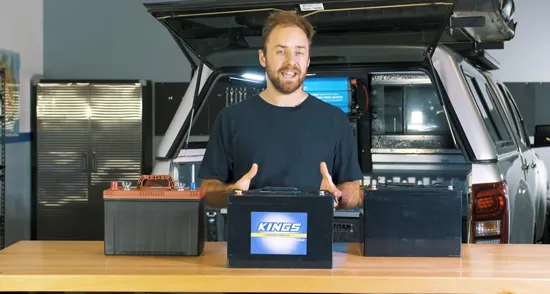
24V RV battery is a great option for a dependable source of power for your motorhome. These batteries are designed to be used in recreational vehicles and provide the dependable power source they need to run appliances and electronics while on the go.
Take an in depth look at the features of 24V RV batteries and why they’re an ideal choice for recreational vehicles.
Types of 24V RV Batteries
A 24V RV battery typically consists of two 12V DC batteries wired together in series. This type of battery is commonly referred to as a “deep cycle” battery, which can be repeatedly charged and discharged without incurring damage or reducing its capacity over time.
The main types of deep cycle batteries used in RVs are lead acid, lithium ion, and AGM (absorbent glass mat) batteries. Each type has its own unique set of advantages and disadvantages that should be considered before making a purchase.
- A 24V RV battery is a lead acid battery that is designed for use in recreational vehicles.
- The battery typically has a power rating of 100 to 200 Ah and can be used to power a variety of RV appliances, including lights, fans, and pumps.
- A 24V RV battery typically has two 12V batteries connected in series, which provides the voltage needed to power RV appliances.
- A 24V RV battery typically lasts 3 to 5 years and should be replaced every few years to ensure optimal performance.
- When choosing a 24V RV battery, it is essential to consider the size of the battery, as well as the type of RV appliances that will be powered by the battery.
- 24V RV batteries are available at most auto parts stores, as well as some hardware stores.
- The cost of a 24V RV battery varies depending on the size and type of battery but can range from $100 to $300.
- Proper maintenance of a 24V RV battery can extend its lifespan and improve its performance.
Battery Capacity
The capacity of a 24V RV battery is measured in ampere hours (Ah). This number indicates how much current (in amps) the battery can supply over a certain period of time (in hours). Higher Ah ratings indicate a larger capacity and longer runtimes than lower Ah ratings.
For example, if your RV requires 8 amps for 8 hours to operate all its devices, then you’ll need a battery with at least a 64 Ah rating (8 x 8 = 64). It’s important to note that different types of batteries can have different capacities even if they have the same voltage rating.
An AGM battery may have double the capacity rating than a lead acid battery with the same voltage rating. This means that an AGM battery will be able to supply more current over more extended periods of time than its lead acid counterpart.
What are the Benefits of Using a 12Volt RV Battery?
RV batteries come in all shapes and sizes, with different chemistries to suit different needs. So, how do you choose the right one for your RV? In this article, we’ll explore the benefits of using a 12 volt RV battery over other types of batteries.
12 volt RV batteries are designed specifically for RVs. They are deep cycle batteries, meaning that they can be discharged and recharged many times without damaging the battery. This makes them ideal for RVs, which often have limited power options. 12 volt RV batteries are typically more affordable than other types of batteries.
Another benefit of 12 volt RV batteries is that they are easy to find. Most auto parts stores carry them, and they are readily available online. This makes them a convenient option for those who want to upgrade their RV’s battery without having to particular order it.
Finally, 12 volt RV batteries are low maintenance. They don’t require any special charging equipment or procedures, and they don’t need to be regularly replaced like some other types of batteries. Simply keep them charged, and you’ll have a reliable power source for your RV for the coming years.
12V RV Battery VS. 24V RV Battery: Heat Tolerance Capacity
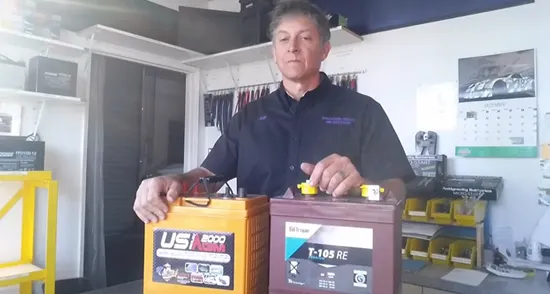
What is Heat Tolerance Capacity?
Heat tolerance capacity measures how well a battery holds up in extreme temperatures. When choosing an RV battery, it’s essential to consider its heat tolerance capacity because this affects its overall performance. Good heat tolerance capacity allows your battery to charge faster and hold its charge longer than a battery with poor heat tolerance capacity.
Comparing 12V and 24V RV Battery Heat Tolerance Capacity
When comparing 12V and 24V RV batteries, both are reliable options that offer great performance even in extreme temperatures. The critical difference between the two lies in their drain rate; the higher the drain rate, the better the heat tolerance capacity will be.
The 12V RV battery has a lower drain rate than the 24v, which can handle more current before draining out completely. This makes it ideal for powering larger appliances such as a stove or ovens that require more power than other appliances like TVs or radios.
The 24v has a higher drain rate than the 12v and is better suited for powering smaller appliances that don’t require as much power, such as lights or fans. It can also be used in combination with multiple batteries to power larger appliances safely and efficiently when necessary.
24V RV Battery VS. 12V RV Battery: Number of Cells
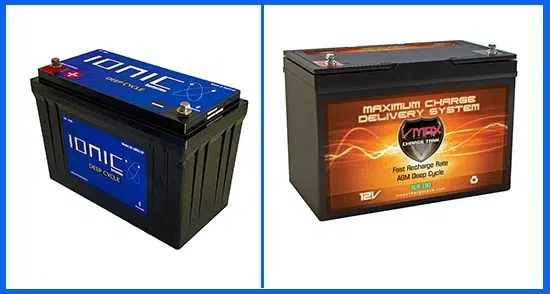
Knowing how many cells each type of battery needs can help you decide which one is best for you and your RV. When deciding which type of RV battery is best for your vehicle, it’s essential to be aware of how many cells each requires 6 cells for 12 volt batteries and 12 cells for 24 volt batteries.
And what your power needs will be so that you can choose accordingly. Knowing this information will help you make an informed decision about which type is right for you and your RV’s power requirements. With this knowledge, you’ll be able to ensure that your RV has enough power while still staying within budget.
Number of Cells in 12V Batteries
A 12 volt RV battery typically has 06 cells. Each cell produces 2 volts, so when all six 12 volt RV batteries are combined with working together, the total voltage is 12 volts. The individual cells are connected to each other in series, meaning that the positive terminal of one cell connects to the negative terminal of another cell, and so on.
This creates a chain reaction that results in the total voltage output being equal to the sum of each individual cell’s voltage output. Most often found in smaller RVs or campers, these types of batteries are used for basic applications such as powering lights or low energy appliances.
Number of Cells in 24V Batteries
24 volt RV batteries have 12 cells in them instead of six. Two volts are produced by each cell, so when all twelve are connected together, they create a total of 24 volts. Like with 12 volt batteries, these individual cells are also connected together in series.
The positive terminals of one cell are connected to the negative terminals of another. To increase voltage output when compared to just using one single cell. These batteries are better suited for more robust applications such as powering air conditioners or other high energy appliances.
How Long Will a 24V Battery Last?
A 24V battery is an essential part of any electrical system, but the life span of such a battery can vary greatly depending on its use. Let’s look at some key factors that affect the longevity of a 24V battery.
Understanding how long your 24V battery should last is essential before needing replacement so that you don’t find yourself without power unexpectedly. The type of battery you select for your RV (rechargeable vs. non rechargeable), temperature and humidity levels, and usage patterns.
All play a role in determining how long a 24V battery will last before needing replacement. Consider these factors when making your choice. With proper care and maintenance, most quality batteries should provide reliable service for many years.
24V RV Batteries: Rechargeable vs. Non Rechargeable
The type of battery you choose will have a significant impact on its life span. Rechargeable batteries are engineered to be used multiple times, while non rechargeable batteries are only meant for one time use.
Rechargeable batteries can usually last anywhere from 500 to 1,000 charge cycles, while non rechargeable batteries may last up to five years if stored properly.
24V RV Batteries Temperature and Humidity
Extreme temperatures and humidity can cause damage to any type of battery, including 24V batteries. In high temperatures, the electrolyte in the battery evaporates more quickly and degrades faster than in cooler temperatures.
Low temperatures can also affect performance; if exposed to temperatures lower than 32 degrees Fahrenheit for extended periods of time, some rechargeable batteries may become permanently damaged.
High humidity levels tend to shorten the lifespan of both types of batteries due to corrosion caused by moisture in the air.
24V RV Batteries Usage Patterns
How often you use your 24V battery is another factor that affects its longevity. If you regularly drain your battery completely before recharging it (known as deep cycling.)
This will reduce its life expectancy significantly compared to if you only partially discharge it each time (known as shallow cycling). High current draw or frequent recharging over long periods can also reduce the life expectancy of your 24V battery.
How Long Will a 12V Battery Last?
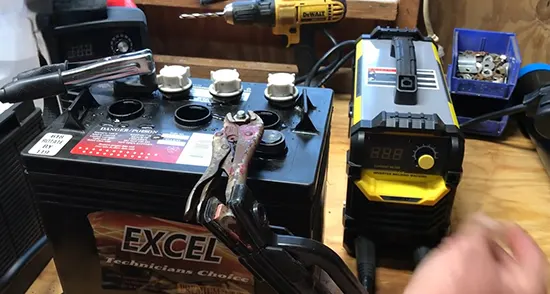
If you’re wondering how long a 12V battery will last, you’re in luck. The answer to this question depends on various factors, including how often the battery is used, the type of battery, and the conditions in which it’s stored. We will discuss all of these different elements so that you can get an idea of how long your 12V battery should last.
All in all, it is difficult to determine precisely for what period a 12V battery will last without considering several factors, such as the type of battery, usage frequency, and storage conditions.
Lead acid batteries typically have lifespans between three and five years, while lithium ion batteries usually go up to 10 years when properly cared for. By following these guidelines, you should be able to get the most out of your 12v Battery for many years.
Types Of Batteries
The first factor that affects the longevity of a 12V battery is its type. There are two types of batteries: lead acid batteries and lithium ion batteries. Lead acid batteries are more common and tend to be less expensive.
They don’t last as long as their lithium ion counterparts due to their shorter charge cycle life. With proper care and maintenance, lead acid batteries can last up to five years. Lithium ion batteries have much longer charge cycles and can last up to 10 years with proper care and maintenance.
Battery Usage
Another critical factor that affects how long a 12V battery can run is usage frequency. If you use your battery every day for long periods of time or if it is regularly exposed to high temperatures or extreme weather conditions, it won’t last nearly as long as if you use it only occasionally or store it in a cool place where fluctuations of temperature is minimal.
Overcharging or undercharging your battery can reduce its lifespan significantly. It is crucial to ensure that you are charging your battery not and adequately overtaxing it with excessive usage if you want it to last as long as possible.
Storage Conditions
Storage conditions also play an essential role in the life expectancy of 12V batteries. Exposure to extreme temperatures, both hot and cold, can cause irreversible damage to your battery over time.
Store your battery in a cool place where temperature fluctuations are minimal, ideally between 40°F (4°C) and 80°F (27°C). Storing your battery in a dry location with good air circulation will help ensure that moisture does not build up inside the casing and corrode the internal components over time.
Overall
A 24V RV battery or 12V RV battery is a great way to ensure you have enough power during camping or road trips. When selecting one 12V RV battery or a 24V RV battery for your vehicle, keep in mind its type and size, capacity, and power output, as well as any charging or any other maintenance requirements it may have. By doing this, you’ll be able to find a reliable source of energy that meets all of your needs.

